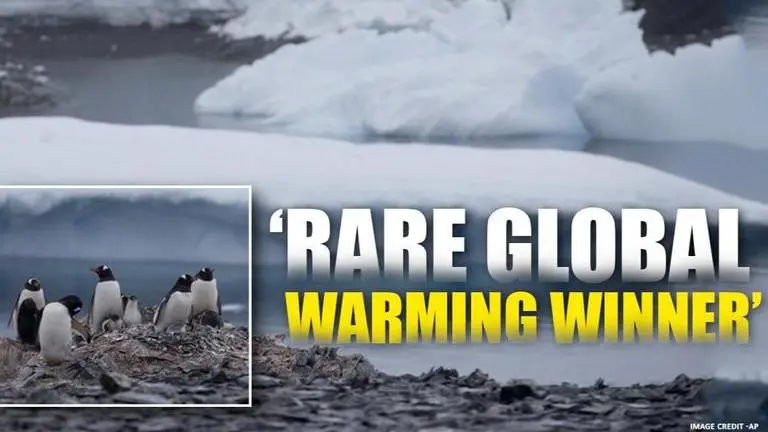Updated 27 June 2020 at 19:44 IST
Antarctica's melting sea ice is making Adélie penguins 'happier': Study
With the Antarctica continent’s sea ice depleting fast, scientists have found that the iconic polar predators’ population increases due to sparse sea ice.
- Science News
- 2 min read

Scientists have discovered that the Adélie penguins in Antarctica preferred the reduced sea-ice conditions as they are "pretty slow waddlers overland" and can access food more easily in ice-free conditions, hence, happier in melted ice due to global warming. With the continent’s sea ice depleting fast, scientists have found that the iconic polar predators’ population increases due to sparse sea ice. These findings have been published in the Science Advances Journal on June 24, 2020.
Researchers with Japan's National Institute of Polar Research electro attached at least 175 penguins with GPS devices and video cameras to record their behaviour across four seasons prevalent in the Antarctic region. Ranging from categorised walking, swimming and resting behaviour to estimate the amount of prey captured during dives, the data samples accumulated by researchers proved that the reduced sea ice was a thrilling condition for the survival of these penguins. In an ice-free season, according to the paper published, "penguins travelled by swimming rather than walking, leading to larger foraging areas, shorter trip durations and lower energy expenditure."
Adélie penguins in continental East Antarctica covered more ground in less time by swimming instead of walking as they searched for prey during an unusually ice-free 2016-2017 breeding season. https://t.co/ESuqgILo7P pic.twitter.com/JTZHo2nbT8
— Science Advances (@ScienceAdvances) June 25, 2020
It turns out that these penguins are happier with less sea ice. This may seem counter-intuitive, but the underlying mechanism is actually quite simple— National Institute of Polar Research
Advertisement
Dive for longer, catch more krills
According to the research, with less ice, the penguins could just waddle over to the water next to their breeding grounds and search for cracks in the ice to breathe. Additionally, they could dive for longer periods and catch more krill. Lead researcher Yuuki Watanabe at the National Institute of Polar Research said, “For penguins, swimming is a whopping four times faster than walking,” adding, “They may be sleek in the water but are pretty slow waddlers overland.”
Speaking about their increased resting behaviour, Dr. Watanabe further said, “It turns out that these penguins are happier with less sea ice. This may seem counter-intuitive, but the underlying mechanism is actually quite simple.” According to the published research, less sea ice also meant more sunlight entering the water, leading to larger blooms of the plankton that the krill feed on, which enhanced the availability of food for the penguins.
Advertisement
Published By : Zaini Majeed
Published On: 27 June 2020 at 19:44 IST


